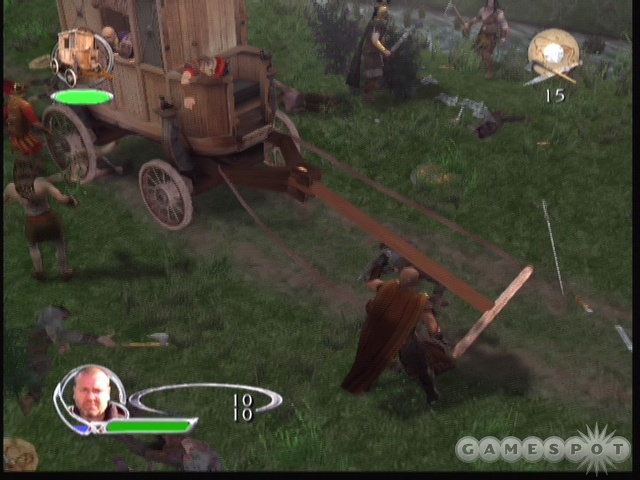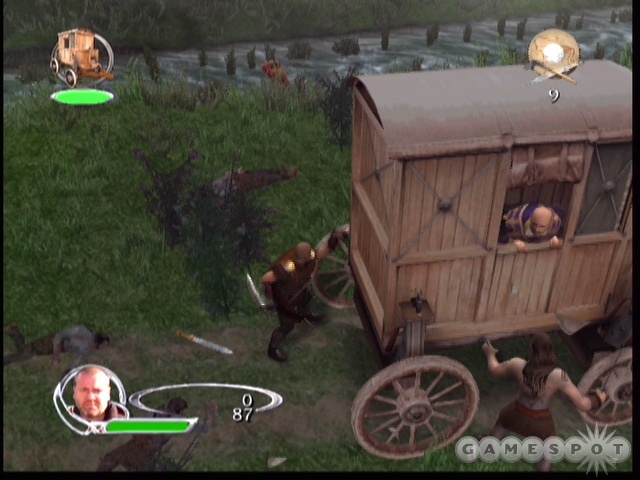Released earlier this year, King Arthur, Antoine Fuqua's high-action epic, was really little more than a blip on the radar amid a slew of high-profile summer releases. Despite offering a unique, more realistic spin on the legendary tale of the British king who helmed the fabled Knights of the Round Table, critics mostly ignored the film, as did audiences. This explains why it's a bit odd that Konami chose to publish a game based on such a mediocre license, especially several months after the film dejectedly slinked out of theaters. But, regardless of its relevancy and tardiness, Konami's hack-and-slash take on Fuqua's film has arrived, and much like the film it's based on, it does little to distinguish itself.

The whole basis for the movie King Arthur was to try to tell the "real" story behind the legend. Set 1,500 years ago in Britain (while it was still tenuously under Roman control), the Arthur of the film is a Sarmatian commander who leads a squad of Sarmatian knights within the Roman army. Arthur's squad is just about to be granted its freedom after 15 years of service, but faster than you can say "He was only one day away from retirement," Arthur's unit is sent on one final mission to rescue a Roman priest and his family. All the primary characters from the Arthurian legend are here, including Lancelot, Arthur's right-hand man; Merlin, who is portrayed as the leader of a rebel tribe called the Woads; and Guinevere, who is no longer the damsel in distress or the focus of a bitter love triangle between Arthur, Lancelot, and herself. Rather, she's a feisty, bow-wielding warrior of the Woads. The story is presented through a series of computer-generated and ripped-from-the-film cutscenes, which actually tie together fairly seamlessly. Similarly, the missions the game puts you on are based entirely within the scope of the film's plot, so if you liked the film, you should very much appreciate how the game relates to its source material.
Unfortunately, that's really about the only thing the game does well, because the gameplay doesn't come anywhere near the quality of the storytelling. Rooted in the sort of rudimentary hack-and-slash gameplay design that made offerings like Gauntlet and Baldur's Gate: Dark Alliance so enjoyable, King Arthur sadly lacks the playability of those titles. This is because the game is tediously repetitive from beginning to end. Despite offering five playable characters, three types of combat, and a basic character-upgrade system, you can't help but feel like you're playing pretty much the same thing over and over again as each stage progresses. Though each of the five characters has his or her own specific talents, more often than not, you can succeed just about as well with any character, making the whole selection process mostly superfluous. For example, Arthur is highly successful with his melee attacks, whereas Lancelot is more effective than Arthur while riding a horse. However, neither character's strength seems to affect the outcome of gameplay that much.
Similarly, none of the different combat types are really all that engaging. Melee combat is what you'll find yourself engaged in during most of the game. You have three attacks of varying degrees of strength, as well as a couple of special moves you can access at specific times. The thing is, however, that you rarely ever find yourself needing these special moves, because they don't tend to be helpful for very long. Mostly, you'll just be pounding on the different attack buttons again and again, and occasionally you'll hit the block button (when the time arises). The other two combat types revolve around bow-and-arrow attacks and attacks from horseback. The bow and arrow is actually a fairly overpowered weapon in the game, and with it, you can both inflict quite a bit of damage and accurately hit most anybody, even when your bow-and-arrow ability is at the lower end of the rankings scale. Horseback combat is the weaker of the two combat types, not because of its relative strength but because of how it handles. The horses are much too slow and plodding, and their assorted kick attacks feel very clunky.
Simplistic combat does not always make for an easy game, so Arthur takes great pleasure in throwing lots of enemies at you, which tend to swarm heavily, leading to lots of spots where you'll get ganged up on. This is not such a bad thing conceptually, since it leads to both a fiercer level of combat and more challenge, but the execution here is problematic thanks to the game's unfortunate lack of a continue system. The game lets you save after each of its just over 20 stages, but during each stage, if you die, that's it. You then have to start the whole thing over again. Early on, this isn't so much of an issue, but toward the later portions of the game, things tend to get pretty tough, which means you'll find yourself replaying more than a few stages over and over again. However, you'll always be replaying these stages from the beginning, which, as you can imagine, becomes intensely frustrating. Any kind of landmark-based checkpoint system would have been highly preferable to what's offered here, but alas, no such luck.
The only other areas of note in King Arthur are its two-player co-op functionality and its character upgrade system. The co-op play is simply a choice you make at the beginning of the game. So if you pick two players, you and a friend can just play through the story as if it were only single-player. This makes sense, since every mission involves two characters, but in a single-player game, the other character is computer-controlled. The one boon to playing co-op is that it tends to be a little easier, because the autonomous characters aren't superhelpful, and because enemies seem to naturally gravitate to your character instead of your artificially intelligent compadre. Otherwise, co-op is exactly the same...so it's still not all that exciting.
The character upgrade system is seemingly kind of an afterthought. At the end of each level, you are graded in a number of categories and then given experience points based on your performance. You can use these points to upgrade your strength, defense, melee attacks, and so on. These upgrades spread across all characters, so it's not like you'll have to spend any time upgrading each character. The trouble is that there isn't much difference in how each character plays through the upgrades. You earn some new combo attacks, which are nice, and the strength and defense upgrades do add a little more oomph to your attacks and to your ability to block, respectively, but the upgrades on offer here aren't like the typical action RPG-styled level systems, where you get big bonuses for making your characters stronger. If anything, all it does is help balance the difficulty of the later levels ever so slightly.
You'll find more to like about King Arthur's presentation than you will about its gameplay, which sort of goes back to the earlier point about the game's solid translation of the film's story in that it also captures the look and feel of the film pretty well with its graphics engine. The character models are smallish and are not highly detailed, but they look enough like their film counterparts, and they do animate decently enough. However, they aren't the best part of the visuals, because the environments definitely take that title. Though, again, not highly detailed, the levels in King Arthur nicely capture the sort of rain-soaked, dreary vibe of ancient Britain, and there's always a fair amount of activity onscreen, which ranges from hordes of enemy warriors running at you to cute forest animals scampering about in the background. The game's camera is occasionally annoying in that it's purely cinematic and can sometimes leave oncoming enemies offscreen until it's too late. But otherwise, the game performs well enough technically, and you won't ever find any glitches or frame rate problems.

The sound category is the area where King Arthur excels. Most of the voice work is taken straight from the movie, and it's used well here. What isn't taken directly from the film is also mostly good, though some of the cries of fallen enemies can get pretty repetitious and grating after a while. The soundtrack is simply brilliant, though, and unlike the voice, the music was created specifically for the game. The score is used extremely well, and the flow of the music is perfectly suited to each battle situation. King Arthur's assorted sound effects also work quite well. The wisps of air as arrows fly and the sounds of swords clashing and hacking through foes all sound great. And if, by some chance, you find yourself playing the Xbox version of the game, it supports Dolby Digital 5.1 extremely well, though this is really the only difference between any of the three versions of the game. Ultimately, its great sound isn't enough to make the game recommendable on any platform.
Perhaps it's only fitting that a game based on a generally uninteresting movie is generally uninteresting itself. However, this doesn't make King Arthur any less of a disappointment. The story of King Arthur, no matter which way you opt to tell it, certainly has the potential to be an enjoyable sort of hack-and-slash action game. However, despite the fact that Krome Studios was able to translate the story, look, and feel of the film well enough into its offering, the gameplay is simply too lifeless and frustrating to hold your attention the entire way through. There's just not enough here to please any but the most dedicated fans of the movie, and even those fans would probably just be better off waiting for the film's DVD release, thereby passing up King Arthur the game.